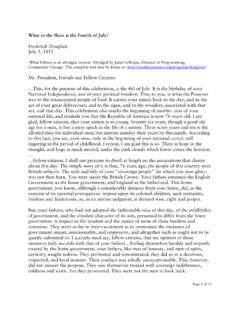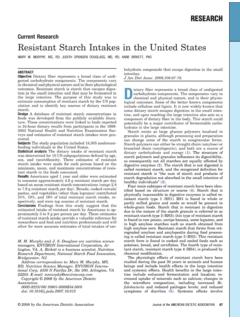Transcription of NARRATIVE OF THE LIFE OF FREDERICK DOUGLASS, AN …
1 1 douglass Narrativetr. de lvarez Fl rezNARRATIVE OF THE LIFE OF FREDERICKDOUGLASS, AN american SLAVEWRITTEN BY HIMSELFFREDERICK DOUGLASSVIDA DE UN ESCLAVO AMERICANO,escrita por l mismo2 douglass Narrativetr. de lvarez Fl rezNARRATIVE OF THE LIFE OF FREDERICKDOUGLASS, AN american slave WRITTEN PUBLISHED AT THE ANTI-SLAVERY OF-FICE, NO. 25 CORNHILL 1845 IntroductionDescribing the generative conditions for Americanabolitionism, the social and political theorist C. L. R. Jameswrites: History really moves when the traditionally mostcivilized section of the population-in this case NewEnglanders representing the longest american line of lawfulsovereignty--joins as coequals with those without whoselabor society could not exist for a day-in this case theplantation chattel. Otherwise, history stays pretty much thesame, or worse yet, repeats itself.
2 Traditionally, studentsof american cultural history have possessed some notionof the abolitionist labors and sentiments of William LloydGarrison, Ralph Waldo Emerson, Henry David Thoreau,John Greenleaf Whittier, and Harriet Beecher Stowe. Thesewhite american spokespeople, whose antislavery effortshave often been studied, are representatives of what Jamesdescribes as an american line of lawful sovereignty. Therole of plantation chattel in american abolitionism,however, and in nineteenth-century american culturalhistory in general, has only recently constituted a coequal topic of scholarly concern. The reasons for this previousneglect are not far to be to the 1960s, an accepted position in Americanliterary and historical studies was that no distinct, authentic,written Afro- american voice existed in the canons ofdiscourse surrounding american abolitionism.
3 This positionacknowledged that the shadowy, silhouetted figure thatmarked advertisements for runaway slaves during thenineteenth century was an icon for an Afro- american im-pulse to freedom that provided motive force for theabolitionist crusade. But scholars of the older paradigmasserted that the written statements of the sovereigns alonewere the only valid and enlightening documents forinvestigating the merger of interests between lawfulsovereigns and plantation chattel. An authentic historyof american abolitionism thus had to await an era in whichAfro-Americans were again on the a sense the literary and cultural history of Americanabolitionism stayed pretty much the same until Afro-Americanspokespeople brought their voices to bear on american historical andliterary-critical discourse during the past two decades.
4 Thesespokespeople called attention to the fact that a written Afro-Americanvoice had been a singular and altogether beneficial part of America smost thoroughgoing nineteenth-century reform. Between 1820 and1860, Afro-Americans produced innumerable written accounts ofFREDERICK douglass : VIDA DE UN ESCLAVO AMERICANO,escrita por l mismoTraducci n J. M. lvarez Fl rezE D I T 0 R I A L Alba, 1995 Introducci nEl ensayista de temas sociales y pol ticos C. L. R. James, aldescribir las condiciones que generaron el abolicionismo estadouni-dense, dice lo siguiente: La historia s lo se pone en marcha de ver-dad cuando el sector tradicionalmente m s civilizado de la poblaci n(en este caso los ciudadanos de Nueva Inglaterra que representaban latradici n m s prolongada de soberan a leg tima) se une en condicio-nes de igualdad con aquellos sin cuyo trabajo la sociedad no podr a exis-tir ni un solo d en este caso los esclavos de las plantaciones.
5 Si nosucede eso, la historia se mantiene pr cticamente igual o, peor a n, serepite a s misma . Los estudiosos de la historia cultural estadounidensehan tenido tradicionalmente cierta noci n de las actividades y los senti-mientos abolicionistas de William Lloyd Garrison, Ralph Waldo Emerson,Henry David Thoreau, John Greenleaf Whittier y Harriet Beecher portavoces blancos, cuyos esfuerzos antiesclavistas se han estu-diado a menudo, son representantes de lo que James describe comouna tradici n americana de soberan a leg tima . Pero el papel delesclavo de la plantaci n en el abolicionismo y en la historia de lacultura del pa s en general, durante el siglo xix, no ha llegado a serhasta fecha reciente un tema de investigaci n acad mica en condicio-nes de igualdad . No son dif ciles de hallar las razones de este me-nosprecio de la d cada de 1960 era una opini n aceptada en losestudios hist ricos y literarios que no exist a ninguna expresi n es-crita [10] afroamericana diferenciada y aut ntica en los c nones deldiscurso que rodeaba al abolicionismo.
6 Esta posici n admit a que lafigura indefinida y borrosa que aparec a en la publicidad dirigida alos esclavos fugitivos durante el siglo xix era una imagen simb licadel impulso afroestadounidense hacia la libertad que proporcionabauna fuerza motivadora para la cruzada abolicionista. Pero los investi-gadores adscritos al viejo paradigma afirmaban que las declaracio-nes escritas de los ciudadanos libres eran los nicos documentos v -lidos e ilustrativos para investigar la fusi n de intereses entre los soberanos leg timos y los esclavos de las plantaciones . As pues,para que pudiese haber una historia aut ntica del abolicionismo ha-br a que esperar hasta un per odo en el que los afroestadounidensesse pusieran de nuevo en historia literaria y cultural del abolicionismo en el pa s se man-tuvo pr cticamente igual hasta que volvieron a unir sus voces al dis-curso hist rico y de la cr tica literaria de las dos ltimas d cadas porta-voces afroestadounidenses.
7 Estos portavoces llamaron la atenci n sobreel hecho de que hab a habido una expresi n escrita que hab a constituidouna parte singular y enteramente beneficiosa de la reforma m s comple-ta que se produjo en el pa s en el siglo xix. Los afroestadounidensesescribieron entre 1820 y 1860 innumerables relatos sobre la instituci n3 douglass Narrativetr. de lvarez Fl rezAmerica s peculiar institution ; they sketched in captivating detailtheir complex ethical and psychological orientations toward slaveryand demanded, in unequivocal terms, the abolition of Southern collective utterances make up what the Afro- american writerArea Bontemps calls an american genre of literary NARRATIVE . Thegenre is more exactingly known as the slave NARRATIVE , and thousandsof representative examples were published between the end ofthe eighteenth century and the beginning of the american CivilWar.
8 Written by ex-slaves, the narratives reveal a common patternof representation consisting of the narrator s experiences in slavery,his heroic journey from slavery to freedom, and his subsequentdedication to abolitionist principles and goals. The motives forpublishing and distributing such narratives are enthusiasticallydelineated by one nineteenth-century editor as follows:The fugitive slave literature is destined to be apowerful lever. We have the most profound conviction ofits potency. We see in it the easy and infallible means ofabolitionizing the free states. Argument provokes argument,reason is met by sophistry; but the narratives of slaves goright to the hearts of men. We defy any man to think withpatience or tolerance of slavery after reading [Henry] Bibb snarrative. Put a dozen copies of this book into every school,district, or neighborhood in the free states, and you mightsweep the whole north on a thoroughgoing liberty platformfor abolishing slavery, everywhere and everyhow (Nichols,1963, p.)
9 178).While the writer s exuberance perhaps overrates thepower of mere words to effect change, his enthusiasm doesnot underestimate the powerful effect that the narratives hadon an immense readership. Works such as The InterestingNarrative of the Lsfe of Olaudah Equiano or Gustavus Vassa,the African (1789), the NARRATIVE of Moses Roper s Adventuresand Escape from dmerkw Slavery (1837), The NARRATIVE ofWilliam Wells Brown (1847), and The NARRATIVE of SolomonNorthup (1853) sold by the thousands. They not only appearedin multiple editions in America but also were translated intoDutch, German, and Celtic. It is safe to say that between 1820and 1860, the period of the narratives greatest production,the slave narrator s voice gained an extensive internationalhearing for the abolitionist for twenty-five or fifty cents in paper-boundpamphlets and for a dollar and a half in more elegant issue, slave narratives provided ready evidence for the argumentsof antislavery spokesmen.
10 The stories of exbondsmen notonly offered testimony to the cruelties of american slaverybut also gave warrant that Afro-Americans possessed thehigher intellectual powers granted to all human beings. Thewhite abolitionists were quick to declare that an articulatespokesman who could produce a work like NARRATIVE of the Lifeand Adventures of Henry Bibb, an american slave (1849) couldbe deemed chattel personal only by an unjust and in tellectuallymisguided system of Southern tyranny that was destined forextinction under the weight of its false narratives were, in great measure, extensions ofthe active oratorical and dramatic roles played bypeculiar ; expusieron con meticulosidad cautivadora sus complejas ac-titudes ticas y psicol gicas frente a la esclavitud y exigieron, en t rmi-nos inequ vocos, la abolici n de la tiran a sure a.

![THINGS FALL APART [1958] - Rodriguez Alvarez](/cache/preview/c/b/e/3/f/6/b/d/thumb-cbe3f6bd22cf6fa0d0cb888d7d467f40.jpg)








